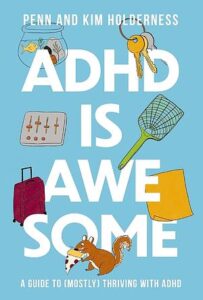
![]()
ADHD is Awesome: A Guide to (Mostly) Thriving with ADHD
Penn Holderness with Kim Holderness
“Dr. Hallowell describes people with ADHD as having a Ferrari engine in a race car brain with bicycle brakes.”
YouTube creator Penn Holderness was diagnosed with ADHD in college. Now he and his wife Kim have written ADHD is Awesome to help readers understand the condition: how it can make things challenging and also how it can be harnessed in career, life, and parenthood.
When several people in my family were diagnosed with ADHD — and knowing it can be hereditary — my husband looked at the list of common symptoms and went, “Ohhh…that explains a lot.” So now we’re on a journey to learn how his big beautiful brain works! We listened to ADHD is Awesome together, and I’m so glad we did; it’s a great combination of scientific explanation and real-life challenges/joys. I particularly appreciated the parts written by Kim — she is a lifelong #AnxietyGirl, just like me, and it was important for me to hear her perspective and how she handles the bizarre, occasionally frustrating, situations her husband ends up in. The book has given my husband and I a shared language we can use to understand and help each other.
Add this to your TBR if you’re interested in learning more about the awesome ADHD’ers in your life.
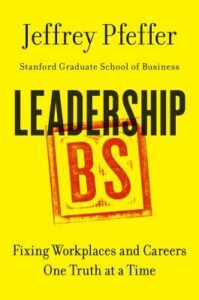
![]()
Leadership BS: Fixing Workplaces and Careers One Truth at a Time
Jeffrey Pfeffer
“…much leadership training and development has become too much a form of lay preaching, telling people inspiring stories about heroic leaders and exceptional organizations and, in the process, making those who hear the stories feel good and temporarily uplifted while not changing much of what happens at many workplaces.”
If you’ve done research around career and professional development in the last decade, chances are good you’ve come across a ton of speakers and resources focused on “great leadership.” But if the ideal business leader takes care of others and is honest and authentic, why do so many of them get away with betraying others and lying? According to author Jeffrey Pfeffer, all the books, blogs, podcasts and courses are a waste of time. Employees are less engaged, leader roles have high turnover, and company leadership development efforts are mostly just inspirational lip service. If we want to change work and leadership, we need to take a different path.
I can’t stop thinking about this book — I’m just not sure why, since I didn’t actually enjoy it. On one hand it was nice to see someone writing about the things I’ve felt for a long time: a lot of “leadership training” is inspiration-focused rather than results-focused; some people put an awful lot of trust in big companies to “look after the little guy” and “do the right thing” when it’s clearly not always the best idea. I think Pfeffer was trying to address two audiences (leaders and individuals), but did a better job speaking to the latter. He does a lot of teasing about what the solution to these larger problems could be, but never seems to get around to sharing it. The primary audience for this book is actually individuals who are not in leadership positions. For these folks I think his advice is sound: look out for yourself, and don’t have blind faith in your company’s leadership to take care of you.
A refreshing, if slightly frustrating, change of pace for those who have attended a zillion “leadership” sessions, events, workshops, etc., and are wondering what they’re actually getting out of it.
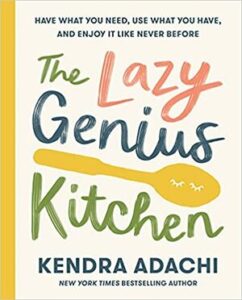
![]()
The Lazy Genius Kitchen: Have What You Need, Use What You Have, and Enjoy It Like Never Before
Kendra Adachi
“Life in the kitchen doesn’t provide any breathers to figure out what you’re doing or what you need. Meals just keep coming no matter how much you need them to slow down.”
The only certain things in life are death, taxes…and that someone has to make food for your family. But most people don’t know much about how to keep a kitchen running efficiently without it also feeling like a scene from The Bear. Enter Kendra Adachi, ready to teach you how to make your kitchen and meals work for you.
Do you ever wish you could meet an author because you just know you’d be besties? That’s how I feel about Adachi. We both love a process/plan and good old-fashioned lists, which is why I enjoy her books so much. My kitchen situation is pretty simple (two adults with non-insane schedules), but even I was able to pull out good info around meal planning and cooking. I have a feeling I’ll be using it as a reference the next time I need kitchen inspiration.
This book is for pretty much anyone. If your kitchen’s in good shape, consider her other books (The Lazy Genius Way and The Plan) for all things Lazy Genius.
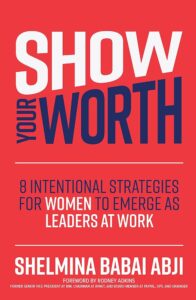
Show Your Worth: 8 Intentional Strategies for Women to Emerge as Leaders at Work
Shelmina Babai Abji
DNF
“…women are thwarted much earlier in their attempt to climb the ladder to the top — there’s a broken rung far down the ladder that’s keeping them from taking that first step up to manager.”
It’s well-established that women face unique challenges as they build their careers. Abji’s book is a deep dive into important topics (everything from defining success to how women can make themselves the best candidates for promotion) that can help women be intentional and strategic about their career growth.
There is nothing wrong with this book. It has lots of great info, and I appreciate the strategic approach to career development. The problem here is me: I’ve heard this all before. Work-life balance, seeking meaningful growth, leadership branding…it’s a rehash of things I’ve already learned or tried. I got more insight and thought-provoking ideas from Leadership BS (see above).
This could be a good resource for readers who are earlier in their careers and haven’t already read a million professional development resources.

![]()
The Victorian House: Domestic Live from Childbirth to Deathbed
Judith Flanders
“Taste, as agreed by society, had moral values, and therefore adherence to what was considered at any one time to be good taste was a virtue, while ignoring the taste of the period was a sign of something very wrong indeed. Conformity, conventionality, was morality.”
The Victorian era (1837 – 1901) ended over a century ago, but its influences are still felt today — especially in the home. The ways we clean, dress, eat, raise children, socialize, and deal with sickness today were crystalized in the 19th century. Judith Flanders’ book is a room-by-room study of the cultural mores and technological changes that impact domestic life then and now.
After reading The Invention of Murder, The Making of Home, and now The Victorian House, I’d wager there are no modern authors who know more about the Victoria era (and possibly the concept of a home itself) than Judith Flanders. Her books are incredibly researched and chock full of details from primary resources, and she does a great job of breaking down the complex world of the Victorian housewife into something that’s fun to read. I also appreciate the glimpses of snark that come through in her footnotes.
Pick this up if you’re interested in the history of domestic life, the Victorian era, and are ready for a lot of details about seating and food at dinner parties.
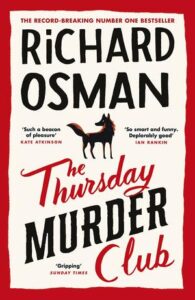
![]()
The Thursday Murder Club (A Thursday Murder Club Mystery #1)
Richard Osman
Book club
“After a certain age, you can pretty much do whatever takes your fancy. No one tells you off, except for your doctors and your children.”
The quiet retirement village of Cooper’s Chase has a Jigsaw Room, and on Thursdays it’s used for puzzles of a different kind. In the two-hour slot between Art History and Conversational French, four friends meet to discuss murder. Usually it’s the old, unsolved type. But when a local land developer turns up dead, the retirees decide to get involved (whether the local police like it or not). Now it’s up to Elizabeth, Joyce, Ibrahim, and Ron to uncover the truth before it’s too late.
My only fiction read for the month — it was my book club’s selection — and boy was it fun! Excellent and lovable main characters, enough red herrings to keep me guessing, and some bittersweet themes and surprises. Growing old isn’t for the faint of heart, and I enjoy meeting characters who love life to the last drop. My only quibble is that there might have been too many “side” plot lines that bloated the character list, but I think that’s related to the fact that this is the first in a long series (book 5 comes out in 2025).
Give this a try if you like sassy characters, murder mysteries, and laughing out loud.
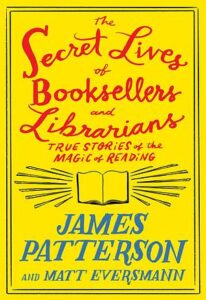
![]()
The Secret Lives of Booksellers and Librarians: True Stories of the Magic of Reading
James Patterson and Matt Eversmann
“Libraries level the playing field. They’re free and open to the public. All are welcome. Our doors are open. Come in and learn to become your best self. Follow your dreams and reach your true potential. Let your reach exceed your grasp. Whatever book you want to read, it’s free on the honor system. It’s hard to imagine anywhere else in our society so devoted to the concept of everyone being completely equal.”
Working with books is about more than standing behind a cash register or sitting behind a desk. It means knowing your inventory and your customers so you can put the right book in the right person’s hands at just the right time. It requires being curious, judgment-free, and having a spine of steel. Secret Lives offers a glimpse of this world through the eyes of dozens of people who have made it their business to share and protect the written word.
Being a reader is like going on a lifelong adventure; a bookish guide who can point you toward the best things, things you know you’ll love, is worth their weight in gold. The people who contributed to this book have made it their life’s work to be that guide to as many readers as possible. Librarians in particular are on the front lines, going toe-to-toe with those who would ban books and open discussion of challenging topics. While I enjoyed this book overall, I had a hard time with the formatting: each item is a little nibble when what I want is a huge bite. I liked the themes more than the individual stories. The participants are readers, not writers, so their storytelling and structure feels disjointed. I wonder if listening to an audiobook where each writer read their own story would have made me feel more connected.
Give this a try if you’re interested in “behind the scenes” info about book selling and libraries and need something you can dip into and out of easily.
Photo by Lukasz Szmigiel on Unsplash






